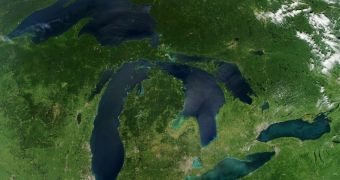A team of investigators from several institutions in the United States, led by scientists from the University of Michigan, has just been awarded a $5 million grant to study water quality in the North American Great Lakes.
The funds, which are provided by the US National Science Foundation (NSF) are mainly aimed at discerning the effects of global warming, climate change, and human-made pollution on the quality of water in the lakes, and on those ecosystems as a whole.
The work will be conducted by a total of 27 investigators. Such a large effort is required because the Great Lakes are extremely important for the nation.
They are estimated to contain about 84 percent of the entire surface freshwater reserve that the country has available, and to support a shoreline population that is roughly 10 percent of all people in the US.
Given these large numbers, it stands to reason that authorities would want to keep a close eye on how the quality of water and that of ecosystems at those locations evolve.
“The suspicion is that climate change will have negative impacts on water quality,” explains the principal investigators of the new study, scientist Anna Michalak.
She holds an appointment as an associate professor at the U-M Department of Civil and Environmental Engineering, and also at the Department of Atmospheric, Oceanic and Space Sciences.
“Climate change is expected to bring about more extreme precipitation events, which will cause pulses of water and whatever it's bringing with it, including nutrients, pesticides and sediment,” she says.
“It's these episodic events that can have a significant impact on the water quality The lakes serve as a source of drinking water and water for agricultural irrigation,” the expert reveals.
“They are used for recreation such as boating, swimming and fishing. They are also a key component of the regional economy,” Michalak goes on to say.
The ultimate goal is to determine how climate change and global warming will affect events such as the frequency and quantity of rain and snowfall, human migrations, land use, agricultural crop variations, chemical pollution and so on. \
As such, the investigation will include experts in the fields of climate research, hydrology, ecology and social systems, those affiliated with the study says.
“Everyone is quite excited about the opportunity for integration and synthesis across disciplines,” says Michael Moore, who is a professor in the U-M School of Natural Resources and Environment.
“We're working at the boundaries of atmospheric science, economics and geography of land use. This is a question that can't be answered by a single discipline or a single science in isolation. To be able to answer these questions, we need integration and interdisciplinary work,” he concludes.

 14 DAY TRIAL //
14 DAY TRIAL //